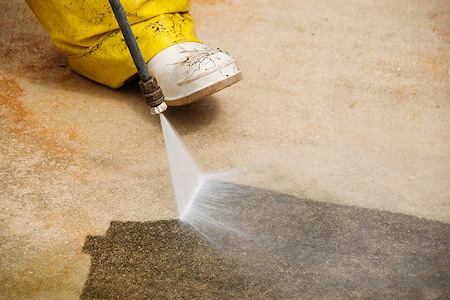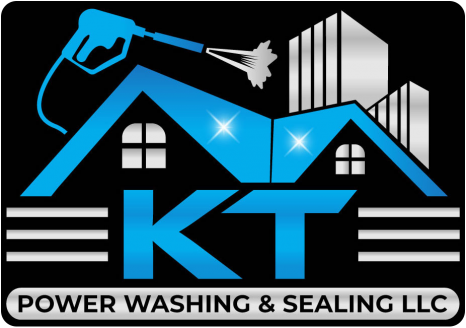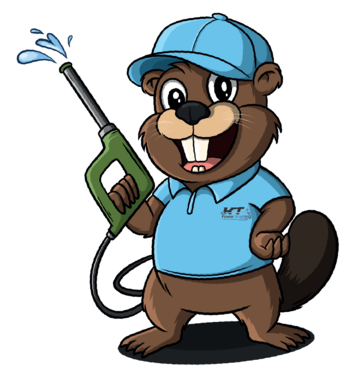Driveway Cleaning in Houston, TX: Hot-Water vs. Cold-Water - Which Actually Works?

Houston driveways take a beating from humidity, pollen, and traffic. If you have dark algae streaks, stubborn oil spots, or gum that will not budge, the question is simple: do you need hot water or will cold water do the job? Here is how KT Power Washing & Sealing approaches it as a local pressure washing team, and why the answer depends on what is on your concrete and how the surface was installed.
If you want a quick overview or you are comparing options, explore our driveway cleaning service to see how we handle different stains and surfaces across Houston neighborhoods.
What Hot-Water Pressure Washing Actually Does
Hot water changes the chemistry of cleaning. When heated water meets oil-based residues, it helps break the bond between the stain and the pores of the concrete. In practical terms, that means better results on engine oil drips, cooking grease spills, heavy tire marks, and old chewing gum.
Hot-water systems also work faster in cooler months and after rainy stretches when grime feels sticky. In Houston, we see this after big storms that wash automotive residue onto driveways in areas like Spring Branch, Montrose, and The Heights.
Hot water is the go-to when you are battling petroleum stains or compacted gum because it loosens the contaminants so the right detergent can lift them away without pushing high pressure into the slab.
When Cold Water Is The Right Choice
Cold water is not “less professional.” It is simply a different tool. With the right surfactants, cold water helps remove organic growth such as algae, mildew, and the faint green film that shows up on shaded driveways under live oaks in West University, Bellaire, and Kingwood. It is also preferred on many sealed, decorative, or newer slabs where heat is unnecessary.
On most general cleanings, cold water plus the correct detergent and dwell time is ideal for pollen, dust, light dirt, and sprinkler residue. Cold water setups are also efficient for maintaining driveways that were deep cleaned within the last year and only need a freshen up after spring pollen peaks.
Do not let anyone attack decorative or stamped concrete with high pressure to make up for the wrong water temperature. The right chemistry and technique matter more than raw force.
Houston Conditions That Change The Equation
Our Gulf Coast climate speeds up growth and staining. Long, hot summers help oil soak into open concrete pores. Humid nights feed algae and mildew. Heavy fall rains can wash iron-rich water from sprinkler overspray, leaving orange rust marks near the sidewalk. Shade patterns from mature trees in areas like Memorial and Meyerland make one side of a driveway turn green faster than the other.
Season also matters. In late spring, pollen blankets everything. In winter, cooler air makes detergents less active, so water temperature and dwell time become even more important. That is why we choose the combination that fits the stain, the season, and the surface condition.
Side-By-Side: Hot vs. Cold For Common Driveway Problems
Here is how the two approaches stack up for issues we see across Houston, from Katy to Clear Lake:
- Fresh oil drips and older petroleum stains: hot water plus targeted degreasers for deeper penetration and faster release.
- Algae, mildew, and dark organic streaks: cold water works well with the right biocides and dwell time; follow with a controlled rinse.
- Chewing gum and sticky spills: hot water softens and lifts without chewing up the surface.
- Tire marks and polymer transfer: hot water improves results when paired with specialty surfactants.
- General dirt, dust, and pollen film: cold water setups are efficient and gentle on sealed or decorative finishes.
Why “Pressure” Alone Is Not The Answer
Concrete looks tough, but it can etch or scar if the pressure is wrong, the tip is too close, or the operator chases stains with a narrow stream. A professional relies on chemistry, water temperature, and flow before increasing pressure. That protects control joints, edges, and any acrylic or penetrating sealer you might have applied last year.
We often pair temperature and chemistry with a surface cleaner to create even, overlapping passes. This reduces wand marks and prevents overcleaning the same spot. The goal is a uniform finish that looks clean in full sun at noon and under streetlights at night.
Our Process For Driveways In Houston
Every driveway gets a quick assessment. We look at stain type, age of the concrete, sealer history, shade patterns, and drainage. Then we choose hot or cold water, dial in the cleaning agents, and set the right pace so the chemistry can do the heavy lifting without roughing up the surface.
Pre-treatment targets trouble areas like the front edge where cars nose in, the garage apron, and the mail box zone where delivery trucks idle. We rinse with controlled passes that move water away from landscaping and storm drains. Protecting nearby plants and grass is part of the plan so your yard looks as good as your driveway when we pack up.
If you want to see the methods we use and what results to expect, our page on professional driveway cleaning explains how hot and cold water fit into a complete service, not a one-size-fits-all approach.
Hot-Water Myths We Hear Around Town
“Hot water is always better.” Not true. Heat helps with oils and gum, but it is unnecessary for many organic stains and can waste time and energy if the chemistry is already doing the job. “Cold water cannot remove tough stains.” Also not true. With the right detergents and dwell time, cold water can outperform hot water on algae and mildew while being gentler on certain finishes.
Another myth is that hotter means faster drying. Dry time is more about airflow, sun exposure, and humidity. On a muggy August afternoon in Houston, air movement and shade are bigger factors than water temperature.
When We Recommend Hot Water
Hot water shines in these scenarios we often see in Cypress, Pearland, and Sugar Land:
- Persistent oil drips in parking spots under SUVs or trucks
- Older gum flattened into the concrete near school pickup zones
- Dark tire transfer from tight turns on textured concrete
- Sticky residues from spilled cooking oils after backyard gatherings
If a spot keeps reappearing, it is usually because residue is still trapped below the surface. Heat plus targeted agents help release what cold water alone leaves behind.
Curb Appeal That Lasts
A clean driveway does more than look good. It reduces slick areas after storms, cuts down on algae tracking into the garage, and boosts the overall look of your home in photos when selling or renting. In neighborhoods with community standards, consistent maintenance helps you avoid warnings while keeping the place looking cared for.
For many homes, a routine cold-water maintenance clean keeps algae from getting a foothold. When life happens and tough stains show up, we pivot to hot water for those targeted areas.
Why Choose KT Power Washing & Sealing For Pressure Washing
We are a local pressure washing team that understands Houston’s weather patterns and water quality. Our techs match water temperature, chemistry, and equipment to your driveway’s needs, then work with care around landscaping, garage doors, and decorative borders. We service areas across the metro, including Pasadena, Clear Lake, and Memorial, with flexible scheduling to avoid peak traffic in your driveway.
If you are comparing providers, remember that training, detergents, and process matter just as much as the machine in the truck. That is how you get a uniform finish without stripes or etching.
See The Difference On Your Block
Want to learn more before you book? Start with this resource on driveway cleaning in Houston, TX to understand how temperature and chemistry work together on local concrete. You will see why an approach built for our climate delivers better results and stays cleaner longer.
Ready For A Cleaner Driveway In Houston, TX?
Your driveway is one of the first things people see. If it has oil spots, algae bands, or gum, let KT Power Washing & Sealing choose the right method for a lasting clean. Call 832-869-0220 or schedule through our page on driveway cleaning to get a convenient time on the calendar.
We serve homeowners across Houston with results you can see from the curb. Our team will arrive on time, protect your property, and leave the surface looking fresh without overspray or streaks. That is the kind of clean that makes the rest of the home feel brighter.

